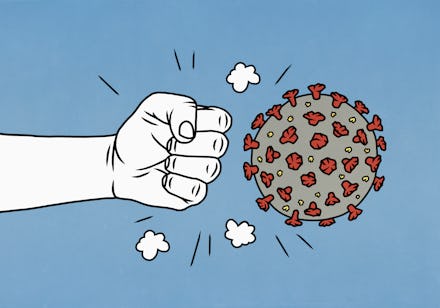Coronavirus could become just a common cold-like illness, a new study says

As the coronavirus continues to tear through the country — sickening more than 22.6 million people and killing 376,476 so far — a new study offers some heartening news for a change. In a paper published in Science today, researchers concluded that the coronavirus may eventually become nothing more than an annoying, common cold-like illness, the New York Times reports.
Sounds heavenly, so let's dig into the details: SARS-CoV-2, the virus that causes COVID-19, has exacted such a heavy toll because our immune systems haven’t seen it before, making them unprepared to fight it (Kids, whose immune systems are constantly exposed to foreign pathogens, are better than us adults at fending off the virus.) Once we’ve all been exposed to SARS-CoV-2 or the vaccine, the virus will become “endemic,” the Times explains, meaning it’ll still hang around, but at low levels, rarely resulting in the serious symptoms we see now.
The study findings underscore the importance of an efficient vaccine rollout, which the U.S. has so far failed to achieve. The length of time it takes a virus takes to reach endemic status depends on rates of transmission and vaccination, Jennie Lavine, a postdoctoral fellow at Emory University and the study’s lead author, told the Times. “So really, the name of the game is getting everyone exposed for the first time to the vaccine as quickly as possible.”
The researchers referred to six human coronaviruses, including the four responsible for the common cold, as well as SARS and MERS, to help predict SARS-CoV-2’s trajectory, per the Times. All six trigger a similar immune response, but SARS-CoV-2 seems to most closely resemble the four cold coronaviruses, which are endemic and cause only mild illness. (The SARS and MERS coronaviruses led to severe illness but were less widespread.)
Based on earlier data, Lavine and colleagues saw that most of us get infected with common cold coronaviruses for the first time when we’re around 3 to 5 years old, on average. We may then become re-infected multiple times, increasing our immunity and spreading the virus in the process, but without getting sick. SARS-CoV-2 may follow a similar path, the researchers assert.
It might be matter of years to decades of natural infections before SARS-CoV-2 becomes endemic, Lavine told the Times, leaving large-scale illness and death in its wake. But with a quickly administered vaccine, this timeline could look more like a year or even half a year. The vaccine probably wouldn’t eradicate SARS-CoV-2, but instead render it less harmful.
Scientists interviewed by the Times who weren’t involved in the study see this as a likely scenario, agreeing with Lavine’s prediction that the vaccine will safeguard against illness, but not infections and transmission per se.
One limitation of Lavine and colleagues’ model is that we haven’t seen how the common cold coronaviruses — which the study assumes SARS-CoV-2 resembles — affects older people who haven’t yet been exposed to them, Marc Lipsitch, an epidemiologist at the Harvard T.H. Chan School of Public Health, told the Times. An alternative possibility: COVID-19 may become akin to the seasonal flu, whose severity varies from year to year.
New viral variants that circumvent the immune response might also make the story less straightforward, Lipsitch added. Still, he believes Lavine and colleagues’ prediction is plausible. In the midst of this grim winter, I’ll take what optimism I can get.